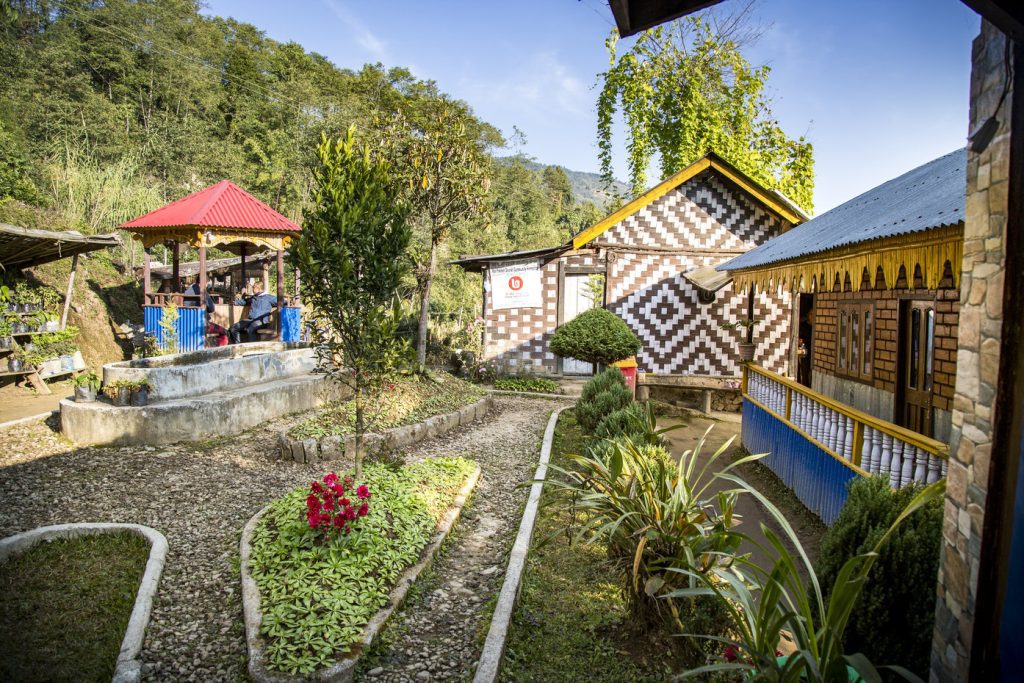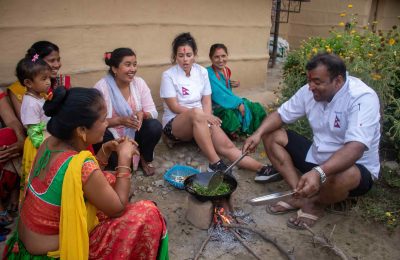Community-based tourism, often abbreviated as CBT, embodies the idea of having travel experiences that forge meaningful connections with local communities, their culture, and traditions. It goes beyond the well-trodden tourist paths, aiming to immerse travelers in the very essence of a destination. Yet, this beautiful concept faces a crucial challenge – it cannot thrive in isolation. To truly succeed, community-based tourism must become an integral part of the broader tourism industry.
Responsible tourism should no longer be relegated to the realm of niche concepts but rather be embraced as a collective effort from the wider travel industry, bringing together all the key actors, partners, and stakeholders involved in the tourism ecosystem. This collaborative effort unites local communities, businesses, governments, and non-profit organizations, fostering the creation of sustainable, authentic tourism products that benefit both visitors and the host communities they engage with.
Creating Sustainable Partnerships for Change
Community-based tourism (CBT) thrives and becomes sustainable when it engages in partnerships for several critical reasons. Understanding the key players behind CBT initiatives and how they are executed is pivotal. Collaboration brings valuable expertise and knowledge to the table, bridging the gap, limited tourism insights often seen in CBT projects led solely by one organization/institution.
The partnerships and collaboration with local people to understand their needs is crucial. Involving them in every cycle of planning and decision making will help in ensuring sustainability and ownership once the project starts its operation. Understanding how and who is behind establishing CBT initiatives in a particular community is important.
Many community-based tourism (CBT) projects in countries like Armenia, Cambodia, Myanmar, and Vietnam did not have successful outcomes because development organizations implemented these initiatives without a solid grasp of the tourism market, leading to discrepancies between what tourists sought and the ultimate failure of the projects. Additionally, when these development efforts didn’t account for local needs, social inequalities persisted. Hence the strong partnership and close work collaboration with business institutions, tour operators and destination management companies helps to ensure CBT offerings that aligns with the demands of the tourism market, thus enhancing their chances of success.
Importance of Stakeholder Collaboration in Community Based Tourism
Collaborations also serve as a means to enhance the capabilities of rural communities, equipping them with the necessary tools and knowledge to effectively market and promote their offerings.
In many articles and discussions, there is a tendency to emphasize the importance of promoting community-based tourism while critiquing larger hotels and tour operators. However, framing one as the villain and the other as the hero can be counterproductive. Such a division may discourage hotels and tour operators from improving their services and making them more environmentally friendly or from incorporating local experiences.
Likewise, community-based tourism (CBT) initiatives may struggle to thrive without support from other stakeholders within the tourism ecosystem, as they often lack the marketing and promotional resources needed to succeed.
Bringing all these partners together can yield benefits for everyone involved and contribute to a sustainable future for tourism. For instance, in the mountainous regions of Nepal, large hotels, resorts, and lodges could consider using locally sourced produce such as cheese and seasonal vegetables or encourage local youths to design CBT initiatives such as hiking experiences, cultural performances, or cooking courses.
The Role of Partnerships in Community Based Tourism Success
This addition of unique, locally-infused offerings could complement the services and products they already provide. Additionally, larger tour operators could easily incorporate these local experiences into their itineraries when planning trips to such destinations. This collaborative approach not only fosters an economically enabling environment for local youths but also adds significant value to the immersive travel experiences offered to travelers.
Having an experience in community-based tourism for over a decade, Community Homestay Network(CHN) has seen only a few famous destinations around Nepal being promoted resulting in limited benefits for rural indigenous communities. With limited exposure to technology, marketing and promotion rural communities are not able to harness their diverse culture and landscapes to the full potential which further perpetuates existing inequality between small and big businesses, and between mainstream and off the beaten path market.

With this experience as well as understanding the importance of promoting tourism that benefits locals and women directly, CHN closely works with community homestay management committees, various impact partners like Planeterra, ICIMOD and USAID Trade and Competitiveness, business partners like Royal Mountain Travel, Nepal Inside Out Treks & Tours, among others to promote community homestays and experiences in a sustainable way. When we say promoting in a sustainable way it involves addressing environmental concerns, safeguarding local culture and traditions, fostering economic and financial stability, and nurturing an entrepreneurial spirit within communities.
Case Studies of Successful Tourism Industry Partnerships
Through a strong partnership with one of Nepal’s leading tour operators, Royal Mountain Travel, we’ve successfully created and are currently offering a community homestay circuit in the Far-Western region of Nepal. This Community Homestay Circuit presents a unique opportunity for responsible exploration of this pristine area, immersed in rich Tharu Culture.
What sets this initiative apart is its holistic approach—it doesn’t just promote a single destination but also provides vital economic support to the various villages and communities along the circuit. By utilizing community homestays and lodges through the community circuits, we ensure that maximum benefits flow directly to the local community. We’ve also included a few hotels in these circuits, offering travelers moments of comfort within their itineraries, which enhances their appeal.
This approach enriches travelers’ experiences by exposing them to multiple cultures while immersing them in diverse landscapes, flora, and fauna. It emphasizes the promotion of authentic places over the marketing of a single specific destination.
By integrating community homestays and lodges into these Community-Based Tourism (CBT) circuits, our partnerships aim to uphold authenticity and sustainability, delivering a wide range of cultural immersion experiences to travelers while ensuring a fair distribution of economic benefits. The responsible promotion of CBT destinations through these partnerships helps our overarching goal of fostering responsible tourism development.
Advocating Collaboration for Responsible Tourism
A Focus on Big Players and Community-Based Experiences
Destination Management Company (DMCs) and tour operators are responsible for planning and organizing travel experiences for travelers. While big businesses can offer local experiences, there’s something unique about CBT. It’s about personal connections, cultural immersion, and supporting small-scale enterprises deeply rooted in the destination. These experiences give you a deeper understanding of the place, fostering cross-cultural connections and lasting memories.
Rather than vilifying large companies, let’s push and advocate where they can actively promote CBT initiatives by including a day trip for community-based activities or adding a few nights of community based accommodations in their itineraries. Moreover push the relevant stakeholders to build/strengthen the policies that promote responsible and fair practices within the industry.
As a travel industry as a whole, we have the opportunity to collaboratively shape an environment to create solutions. A noteworthy illustration of this approach can be found in initiatives like Royal Mountain Travel and how established travel businesses can champion local experiences by partnering with the Community Homestay Network to showcase and market Nepal’s diverse communities. Notably, their support extends in crafting unique itineraries, which they then distribute to their B2B agents.
By partnering with community-based organizations, DMCs can ensure that the economic benefits of tourism reach the local community. While saying that, we need to also carefully consider and ask how tourism can really support local needs and can contribute to the local communities in the long-term.
It is always important to measure the cost and benefit of tourism in each destination, especially the emerging ones for a sustainable future. It is also equally important to respect the local culture and ensure their participation to co-create or design tourism products and services which forges a sense of pride and belongingness among them.
Influential Role of Content Creators and Responsible Travel Choices
Content creators, writers and influencers have a significant influence over travelers’ perceptions and choices. They have a crucial role to play in promoting community-based tourism (CBT) by showcasing these experiences through their content. This might involve crafting captivating travel narratives, capturing local festivals and traditions, revealing hidden gems and explaining the importance of having immersive experiences with local communities.
As they have the power to shape travelers’ minds, these contents must be curated with utmost responsibility by sharing genuine and compelling stories. By researching about the immersive and authentic community-based initiatives, sustainable tourism practices, and local narratives, writers can provide readers with a deeper insight into the destinations they explore. This, in turn, can influence travelers to prioritize responsible travel choices.
Additionally, it’s essential for tour agents and destination promotion companies to be careful in their selection and promotion of ethical writers, ensuring that stories promoting greenwashing or community-washing do not gain prominence. As travelers, it’s also upon us to exercise our choices regarding the information we consume, the individuals we follow, and the impact it has on our travel choices and behaviors.
A Multistakeholder Approach to Responsible Development
At the core of our efforts lies the imperative for government frameworks and policies to incentivize and actively promote more responsible and equitable practices among major industry players. For instance, consider Dhankuta municipality, situated in the eastern region of Nepal.
Despite its significant tourism potential, Dhankuta has struggled to attract visitors. Several challenges hinder its development as a tourism destination, including inadequate tourism infrastructure, a lack of expertise among service providers, limited access to markets, and insufficient marketing and promotional initiatives. Given Dhankuta’s water scarcity issue, the establishment of new large hotels and infrastructure is not a viable solution.

However, there is an opportunity to offer rich cultural experiences through the enhancement of community tourism. The local government acknowledges Dhankuta’s substantial tourism potential and is committed to a thoughtful and well-planned approach rather than hasty promotion. They have forged partnerships with inter-governmental organizations such as ICIMOD, with whom they have a longstanding collaboration in integrated watershed management to address water-related challenges.
To address water management issues and diversify livelihood options, ICIMOD has brought together various partners, including HUSADEC (a local non-governmental organization), the Community Homestay Network (a private entity), and Smart Paani (an institution specializing in water-smart solutions). Together, they are working to develop Dhankuta as a sustainable and resilient destination by initiating community homestay programs in identified locations and clusters.
Sustainability Challenges and Strategies in Scaling Community-Based Tourism
Balancing profitability with sustainability poses a challenge, as larger organizations may prioritize profits at the expense of the social and environmental aspects of community-based tourism (CBT). Therefore, partnerships must prioritize sustainability as a fundamental goal.
Maintaining the authenticity of CBT experiences is another concern when scaling up, demanding a strong commitment to preserving genuine and culturally enriching encounters. Ensuring meaningful community involvement, where locals actively participate in decision-making and benefit-sharing, is crucial for the success of CBT initiatives. Additionally, mitigating over-tourism risks in popular CBT destinations, which can harm the environment and local culture, requires a focus on responsible visitor management.
Educating travelers about responsible tourism practices and government policies that incentivize and support CBT are essential components of effective partnerships. Finally, continuous monitoring and evaluation should be integral to partnerships, enabling ongoing assessment and improvement of CBT projects’ impact on local communities and the environment.







